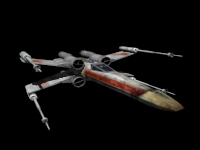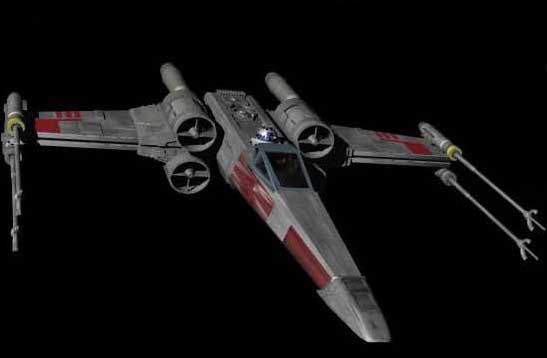
Ship Specs
Imperial Ships
Imperial Fighters
New Republic Ships
New Republic Fighters
Transport Craft
Non-aligned Craft
Multimedia
Ship Pictures
Wallpaper
Manufacturers
Major Corporations
Designers/Manufacturers
Shipyards
Fleets/Squadrons
Notorious Fleets
Imperial Squadrons
New Republic Squadrons
Imperial Pilots
Rebel Pilots
Non-Aligned
Commercial Groups
Pirates/Smugglers
Ranks
Imperial Navy
New Republic Navy
Other
Historical Battles
Tactics
Complete Ship Listing
Further Study
 |
 |
| Name/Model# Incom T-65c A2 X-Wing Designer/Manufacturer Incom Combat Designation Space Superiority Fighter Power System Novaldex O4-Z cryogenic power cells and ionization reactor Propulsion System Four Incom 4j.4 fusial thrust engines (300KTU) Flight Control System Torplex Rq8.y flight control avionics package Navigation R2 or R5 astromech droid Crew 1 pilot, 1 astromech droid Speed Rating 100-110 MGLT Maneuverability Rating 75 DPF Hyperdrive Incom GBk-585 motivator drive unit Sensor Systems Fabritech ANS-5d unit with a long range Phased Tachyon Detection Array model# PA-9r and one short range Primary Threat Analysis Grid model# PG-7u Targeting Computer Fabritech ANq 3.6 tracking computer and IN-344-B "Sightline" holographic imaging system Weapons Four Taim & Bak IX4 Laser Cannons Two Krupx MG7 Proton Torpedo Launchers (3 torpedoes each) Shields/Armor Forward/Rear Projecting Chempat Shields (50 SBD); Titanium Alloy hull Special Design Features S-Foil Wings, adjustable for atmospheric flight |
X-Wing is the common name for the Incom T-65c A2 Starfighter, a 12.5 meter snub fighter with two wings that split in two by activating S-foils. Having the wings in the "X" position allows for greater maneuverability and firing accuracy; each of the split wings has its own laser cannon (total of four). Having the S-Foils down allows for better flight control in atmosphere. It is a single-pilot ship, with an R2 astromech droid socket. The R2 unit is used in place of a navigation computer. It is extremely maneuverable, even at its top sublight speed of 110 MGLT. It has also been clocked at 1,050 kilometers per hour in an atmosphere. The X-Wing was designed by Incom just before the Empire stopped contracting out naval construction. The Empire believed that Incom was infiltrated by Alliance sympathizers, and relieved the X-Wing team of duty. The X-Wing team then defected to the Alliance, flying out with all the X-Wing prototypes and the starfighter's plans. Their parting gesture to the Empire was to destroy all records of the X-Wing in Incom and Imperial databases. The Alliance then began to produce the X-Wing themselves, recognizing its potential. It continued to gain acceptance after the Galactic Civil War due to its maneuverability and durability. Several upgrades and modifications from the liberated Incom design team didn't yield major improvements until the advent of the T-65d A1, which eliminated the astromech droid in favor of more computer power to provide the pilot with more in-flight options in terms of maneuverability and management of shipboard resources. The T-65c A2 boasts the following shipboard components: Incom GBk-585 Hyperdrive Motivation Unit, Incom MKI Drive Module, 4 wing-mounted Incom 4j.4 Fusial Thrust Engines (some models use Incom 4L4 Fusial thrusters), IN-344-B Sightline Holographic Crosshairs, 4 Taim and Bak IX4 Laser Cannons (some models use Taim and Bak KX9 laser cannons), Fabritech ANq 3.6 Target Tracker, Fabritech ANs-5d Sensor Unit, Fabritech k-blakan Mini Sensor, S-foil Activator, Gax Revival Life Support System, Guidenhauser Ejection Seat, Novaldex O-4Z Ionization Reactor, Chempat Defender Shield Projector (rated at 50 SBD), Cryogenic Power Cells, Torplex Rq8.Y Avionics Control Package, Carbanti Universal Transceiver Package, Melihat Multi-Imager Dedicated Energy Receptor, Tana Ire Electro-photo Receptor, Long Range Phased Tachyon Detection Array Model Number PA-9r, Short Range Primary Threat Analysis Grid Number PG-7u, Bertriak Screamer Active Jammer, Krupx MG7 Proton Torpedo Launchers (2 racks of 3), Titanium Alloy Hull (rated at 20 RU), Transparisteel Canopy, R2 Astromech Navigation Droid, 4 Exhaust Nacelles, Sarylcorp Reactant Agitator Injector, a Surge Vent and an Extinguisher. One of the many improved versions of the Incom Industries X-Wing starfighter, the A3 was developed during the second decade of the New Republic. It boasted improved shielding and lasers, both of which required less power to operate, but were more efficient and accurate to use. It was bested in its generation only by the T-65XJ model developed for use by the Jedi Knights. One of the main upgrades on the T-65A3 was the secondary fire button on the command stick. It allowed the pilot to fire in a cycling, single-laser pattern no matter how the weapons were fire-linked. This secondary fire was shot out with less power than normal, allowing the weapons to cycle rapidly. This proved to be of use against the coralskippers of the Yuuzhan Vong, as it allowed pilots to pour larger amounts of energy into their black-hole shields, causing the shields to collapse. Regular firepower could then be used to punch through the coralskippers' rocky exterior. The AC4 version of the Incom X-Wing starfighter as produced about ten years after the Battle of Endor. It had speed to match an A-Wing, but was still as rugged and sturdy as the original X-Wings. The AC4's incorporated numerous advances in targetting, fire control, and power distribution. Armament remained similar to the original. The T-65BR was developed for use as a reconnaissance craft during the early years of the New Republic. The proton torpedo launchers were removed and replaced with high-gain long-range sensors. The T-65BR relied heavily on the use of an astromech, which acted not only as a navigational aid but as an automated controller of the sensor packages. Each T-65BR was also rigged with a deadman self-destruct system, which would destroy the ship if the pilot was ever killed in combat. This ensured that any data recovered by the ship would be lost and untraceable. The T-65D-A1 was introduced about seventeen years after the Battle of Endor. This X-Wing replaced the astromech R2 unit with additional computer power, providing more maneuverability and increased in-flight options for the pilot. The New Republic began replacing its old, aging T-65As with the T-65D-A1, until Cole Fardreamer discovered that their new shipboard computers were rigged with Imperial detonation devices. The computers had been built under the direction of Dolph, who planned to detonate them from Almania at a specified time. Cole found the detonators while repairing Luke Skywalker's old X-Wing, which was being refitted with the new computers. He showed the detonators to Wedge Antilles, who had originally ordered the newer X-Wings to replace the old ones. Wedge began recalling the newer ships before they could explode, and new computer systems were ordered to replace the rigged ones. The T-65R was designed for surveillance and reconnaissance. Known as a snoopscoot, it employed a pair of sensor pods which trailed behind the ship to gather data on a nearby world. The sensor equipment could be jettisoned if the ship was attacked, and the pods recovered later. The T-65R lacked weapons, so it was often accompanied by other starfighters. The X-Wing XJ is a heavily-modified version of the durable X-Wing starfighter and was developed two decades after the Battle of Endor by Incom. Among the enhancements over the original models, the XJ had three proton torpedo launchers, each of which carried three torpedoes. The XJ series ship also had improved fire-linking capability, with the ability to link the four laser cannons in specific patterns of fire, rather than just combinations of the four guns. Thus the weapons could be configuration to fire a pair of dual bursts - from any combination of cannons - followed in the cycle by a single quad burst from all four cannons. The XJ was also equipped to use an R7-series astromech droid. Two of these ships found their way into the small fleet maintained by Kyp Durron, and many civilians believed that the "J" in the designation indicated that the ships were produced for the Jedi Knights. The TX-65 was an X-Wing-based training fighter that accommodated a trainee and an instructor. It was wider than a standard X-Wing, but allowed the trainee to obtain valuable experience in piloting a starfighter. |
Koensayr BTL-A4 Y-Wing
RZ-1 A-Wing
B-51 B-Wing
Z-95 Headhunter
R-41 Starchaser
T-Wing
E-Wing
K-Wing
T-120 C-Wing
V-Wing
X-200 W-Wing
H-Wing
D-Wing